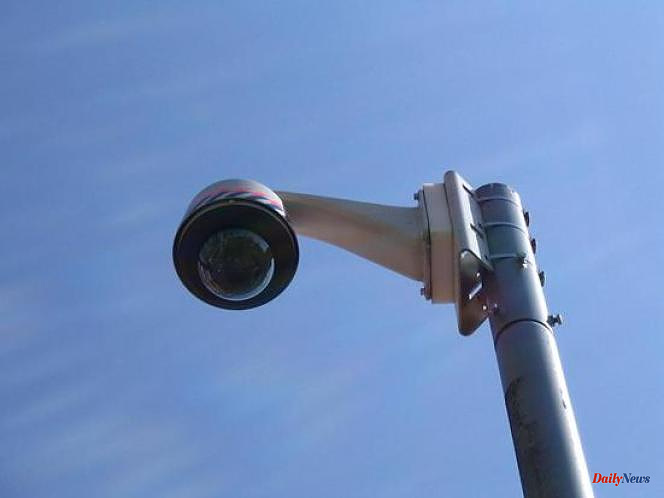The Minister of Sports and the Olympic and Paralympic Games (JOP), Amélie Oudéa-Castéra had mentioned "some twenty-five guarantees" on March 1 during a hearing at the National Assembly. "There are twenty-eight guarantees", for his part declared the Minister of the Interior, Gérald Darmanin, on Wednesday March 22 before the deputies, about the experimentation of so-called "intelligent" video surveillance, which the government through the bill "relating to the JOP and containing various other provisions" - already adopted by the Senate.
If Mr. Darmanin has set out these guarantees one by one, and if article 7 of the bill authorizing experimentation with the processing by algorithms of images captured by cameras or drones, was adopted on Thursday by the National Assembly after long discussions (59 votes for, 14 votes against), the framework measures put forward did not bring down the prejudices of elected officials on the left. "Respect for privacy will still take a big hit," denounced Elisa Martin (La France insoumise).
An experiment that does not only concern the Games
"An exceptional situation, exceptional means", justified Mr. Darmanin about this experimentation with algorithmic video surveillance, the term "exceptional situation" referring to the JOP of the summer of 2024.
However, the implementation of this technique will not only concern the Games: it will apply to "sporting, recreational or cultural events" in general, which "by their scale or their circumstances, are particularly exposed to risks of acts of terrorism or serious threats to the security of persons".
The experiment may also begin as soon as the law is promulgated - it should be applicable for example from the Rugby World Cup this fall - and it will extend beyond the Games, until the end of December 2024. .
The deputies reduced this test period which, initially, was to extend until the end of June 2025. The elected representatives of the National Rally sought to restrict it even more, by asking that the use of this algorithmic processing, which they are in favor of, is limited to JOPs alone. Without success.
"What is abnormal behavior? »
"Exceptional demonstration, exceptional means", agreed the socialist deputy Roger Vicot, but to add immediately that this does not amount to "asking for a blank check". It was aimed at the definition that will be given to the "abnormal behavior" that algorithmic video surveillance systems will be supposed to detect. "You tell us, 'Trust us, a future decree will determine that.' That's not the way to do things." "Abnormal behavior is blurry," echoed Sandra Regol (Europe Ecologie-Les Verts).
"It's about having a decision-making tool for law enforcement, it's not about recognizing people who would have this or that profile, or hoodies, but predetermined situations , such as fire starts, bottlenecks, abandoned packages or crowd movements, ”replied, on several occasions, Mr. Darmanin.
"An operator will decide if this deserves an intervention", insisted the Minister of the Interior, while assuring, as the government has been doing for weeks, that it is not a question of setting up "facial recognition and biometric processing".
But not everyone puts the same thing behind this term biometric processing. “The Defender of Rights explicitly recalled that the detection of so-called abnormal behavior was based on biometric data, underlined Lisa Belluco (Europe Ecologie-Les Verts). The algorithm will make it possible to recognize people, without necessarily identifying them. Recognize means to provide a description detailed enough to enable officers in the field to locate a person."
A regulation expected at European level
On March 17, around forty MEPs, overwhelmingly from the Greens, S
This "regulation is being negotiated, and there is a majority in favor of a strict ban on mass biometric surveillance", they added, recalling that the European Parliament, in a report in 2021, "precursor of the law on artificial intelligence,” called for “a 'permanent ban on the use of automated analytics (…), human characteristics (…), and other biometric and behavioral signals'”.
This argument was put forward by Ugo Bernalicis (La France insoumise): "You feel that bans could be decided at European level, but you want France, with the device it will have adopted, to weigh with all its weight for the European Union to come to its positions", launched this one.
“In April, a European regulation will be promulgated” on the use of artificial intelligence, which “a priori will not go in your direction, because the Member States of the European Union are mainly opposed to it”, added Elisa Martin, considering that it would have been "wise to wait" before voting.
"The vote of the European Parliament will probably only take place at the end of 2023 and the text will only come into force from 2025", challenged Philippe Latombe (MoDem). "It's not about pre-transposition here, it's about protecting the Olympics and ensuring the safety of those who attend," added the deputy, who is leading a fact-finding mission on "the issues of the use of security images in the public domain for the purpose of combating insecurity".
The entire bill "relating to the JOP and containing various other provisions" must give rise to a solemn vote of the deputies on Tuesday, March 28.












